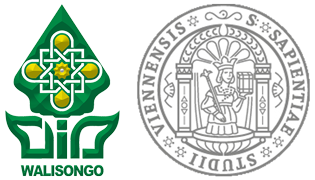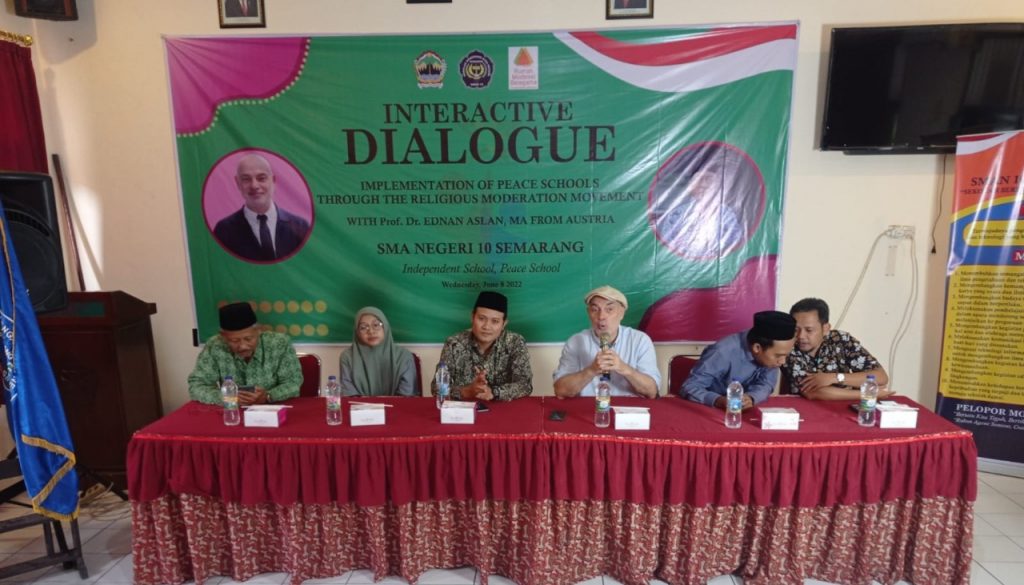In researching Islamic education in Indonesia and Austria, State Islamic University (UIN) Walisongo Semarang and Vienna University collaborate.
This is evidenced by the cooperation program between UIN Walisongo and the University of Vienna, Austria in a research entitled “The Yield of Islamic Religious Education-An Evaluation of The Effect of Islamic Religious Instruction in Central Java”.
In addition, UIN Walisongo also managed to bring one of the Professors of Islamic Religious Education, University of Vienna, namely Professor Ednan Aslan, M.A. as a guest lecturer to teach postgraduate students, especially doctoral students.
To facilitate the research of Professor Ednan Aslan, M.A. in Indonesia, UIN Walisongo held a selection for graduate students and lecturers to select the best three, who will later be assigned as research assistants for Prof. Ednan.
The three selected names are Luthfi Rohman, M.A., a lecturer in Religious Studies and Social Studies; Moch Maola Nasty Gansehawa, M.A., a lecturer in Islamic Anthropology; and a graduate student Nurul Uzdhma Tastia, S.Ag. The task of the selected research assistants is to accompany Prof. Ednan to complete research in Indonesia, especially in Central Java, from May to the end of September 2022.
It should be noted that they will have the opportunity to visit the University of Vienna, Austria from October to January 2023.
The research is expected to have a major impact on the development of Islamic Religious Education in Indonesia and Austria, especially for high school level.
“The object of the research in Central Java is focused on students of grade XII of high school, those who are in the last year of compulsory education in Indonesia, especially for SMAN located in Semarang and surrounding cities, Central Java Province,” said Moch Maola Nasty Gansehawa, M.A on Wednesday, June 29, 2022.
In addition, this research will also involve teachers who teach Islamic Religious Education subjects.
As for some SMANs that have been visited by the research team are SMAN 2, SMAN 7, SMAN 3, SMAN 4, SMAN 10 and so on.
It is known that the model of the visit that has been carried out is primary research and will be refined with main research in July.
In accordance with the title of the study, this research aims to determine the impact of Islamic Religious Education on students’ knowledge and behavior.
Referring to previous research in Austria, the locus of comparison is students who attend Islamic Religious Education classes and those who choose not to attend classes. Because it is different from the policy in Indonesia which requires all students to take Islamic Religious Education, while in Austria there is freedom to take Islamic Religious Education at the age of 14.
So that this interesting thing becomes the object of research to find out how the differences in attitudes and behavior of the two student models.
In contrast to Muslim students in Indonesia who live in a country where the majority of the population is Muslim, their knowledge of religion is certainly sufficient because Islam in Indonesia indirectly lives in the traditions of its people.
Therefore, the question is how students’ knowledge and behavior if they live in a country with a Muslim minority. In addition, it is also necessary to study how the difference between students who only receive Islamic Religious Education in the classroom and those who also actively participate in TPQ or majlis dzikir, Islamic studies and the like.
Hopefully, the international research will always be given ease in solving various research puzzles in it and become useful for the development of Islamic Religious Education in Indonesia and Austria.
Editor: Muhammad Ahlan Kalasuba


